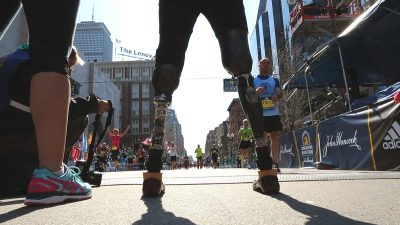
Most will remember the 2013 Boston Marathon and the bombings that darkened the day, killing three and injuring more than 100. HBO’s “Marathon: The Patriots Day Bombing,” released Friday, is an emotional and powerful masterpiece of journalistic integrity. It is demonstrative of the fine artistry of documentary filmmaking that covers a timeline beginning several years prior to the attacks and following several families to the present day.
The film follows families of very different backgrounds and paths to viewing the marathon and recovering from the attacks. The Richard family’s physical recovery is abbreviated, but the emotional pain is so unfathomably great that even the fractional portion of it portrayed in the film is an almost unbearable weight on the viewer. Their son, 8-year-old Martin, died on the scene, their daughter lost a leg, Mrs. Richard lost an eye and Mr. Richard lost most of his hearing.
For newlyweds Patrick Downes and Jessica Kensky, who collectively lost three lower limbs (Jessica, both legs, and the Patrick, one), their struggle has been endured in an endless string of operations, reconstructions and physical therapy. Progress, albeit existent, is tragically disparate in relation to the irreconcilable time and tremendous dedication of their efforts.
For the mother-daughter pair Celeste and Sydney Corcoran, the physical damages (a double amputation for Celeste and extensive limb reconstruction for Sydney) are only part of an equation in which a sacrifice of self-image and basic pleasures — the feeling of toes in the sand, being able strut confidently down a sidewalk, an authentic enjoyment of a hearty meal — is striking in a way that prompts a reconsideration of the simplicities of everyday life.
With brothers JP and Paul Norden, the loss of a limb is a loss of a former life: the independence of walking down the stairs of their two-story home, or of active construction on the jobsite of an addition on a friend’s house. The mourning is less for the limb itself than for the changes from what was and what could have been.
Through coverage of the investigation of the Tsarnaev brothers, from the dozens of terabytes of photo and video used to identify the attackers to a massive manhunt across Greater Boston, to the trial and ultimate death-penalty sentence of Dzhokhar Tsarnaev, the remarkable investigative work of the Boston Police Department, the FBI and The Boston Globe adds a complex dimension to the film.
The fears of “homegrown” terrorism and the implications thereof make the documentary a fundamental tenet in not just understanding the struggle of recovery, but also the challenges of national security with an emotive and passionate element that other films of similar subject matter lack.
The film’s coverage of the lives of each of these victims is by no means considered to be representative of all of the survivors of the attack, and its producers recognize that. In sacrificing a comprehensiveness of number, “Marathon” thrives on the provoking, poignant intimacy of stories it does tell.
Filmmakers managed to avoid exploitation of the opportunity to document the lives of the survivors. It is this aspect — the purity and the knowledge that the emotions conveyed are real and enduring — that plays a major role in the engaging, touching nature of the film.
In a way, the production feels as if it serves as a catharsis for the survivors, allowing them to express their emotions and to demonstrate that a single event can have years upon years of emotional and physical pain. There is a sensation that the viewer is having a one-on-one, deep conversation with each survivor as they recover, and the raw emotion inherent in each scene evokes compassion and something far more impactful than the sympathy typically associated with documentaries surrounding tragedy.
By following each of the survivors in real time, rather than an abstract storyline, the process of healing is felt on an almost terrifyingly real level; the inclusion of footage from the explosions leaves the viewer shaken, and the detail and expertise with which each experience is described is simultaneously brutally realistic and beautifully crafted. The work is exemplary of the strength of narrative journalism put forth by HBO and the Globe.
Extremely powerful and overwhelmingly emotional, “Marathon: The Patriots Day Bombing” is a must-see for Boston and for the world. Perhaps never before has a documentary been so effective in bringing terrorism, pain, recovery and community to the forefront of the cinematic stage.
It draws attention to the fundamentals of the human condition: overcoming mental and physical strife, putting on a brave face and pushing through in the face of uncertainty and disparate recovery processes. Obstacles for each of the survivors are bound to continue to arise, as the attacks have left a titanic imprint on the lives of all involved, yet one aspect refuses to recede into the background of history: the unending dedication of survivors to keep moving forward.















































































































